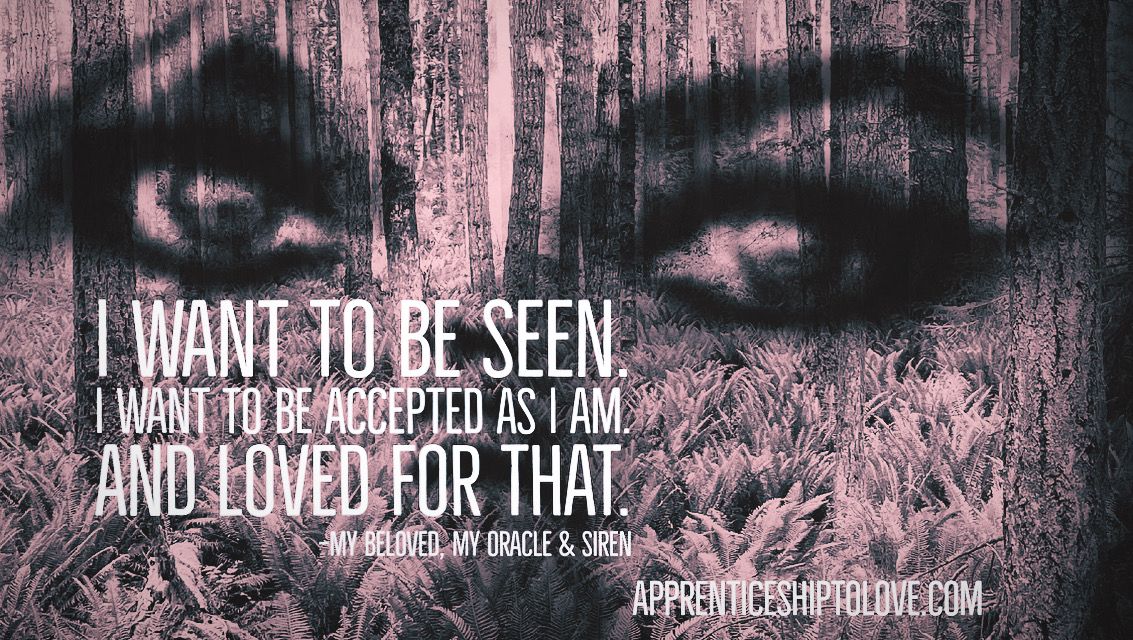FEEL INTO THIS MARRIAGE & LET IT HURT

Apprenticeship to Love: Meditations on this Path to Authentic Relationship, October 19, 2023
• Today’s questions: Consider this, even if you are not "married," to what are you wedded? To what are you deeply committed? And how have you weathered this commitment in a life and a world that is constantly changing and constantly inviting you to feel less rather than more, to abandon your commitment to this thing —yes, your marriage, your career, your child, your family, yourself? Do you feel these invitations to feel less? Do you feel the invitation to feel more? And what now?
• Today's suggested practice: Day 19 of this month's practice, to notice & receive while in motion (see my "Short Practice,” below)
• My practice today: 3:45am: 90 minutes: yoga, mantra, and Meditation to Increase Subtle Awareness.
• My vulnerability practice: I feel pressure. To do more. And yet, doing less is, I know, the only answer my body-mind can give...
★The video recording of the virtual workshop with Max Trombly, on "Men & Divorce II," is now available. If you are a Premium and Premium+ subscriber you have access, and you can share access, and especially with men who may be at risk of divorce. I say "at risk" because divorce is one of the most difficult things a man will go through. It is life-threatening. A man who is divorced is 2.5x as likely to suicide as a man who is married, and 4x as likely to suicide as a woman who is divorced. Email me at rev.hans@sacredbodies.ca for your access point.
TODAY'S MEDITATION
To accept the burden of commitment is to cross a threshold into an adulthood very few of us are prepared for. It is one of the initiations we undergo in this life. Every one of us. Whether we choose to "marry," or whether we choose to sit this one out. A commitment is made. And there is pain.
To the uninitiated (& we are all uninitiated in the always-new moment of being alive) the experiences of pleasure & pain are too proximate to be taken for granted.
What I can say, with some confidence, is that opening into whatever pleasure this moment holds for me —and for you, and for all of us— deepens as I bring my full awareness to what it is I am experiencing. Breathing, and learning how to be still with it, I allow myself to feel it all.
This is the risk that marriage and every commitment we make, every threshold and every initiation into beyondness, invites us to accept. More than that, this is an invitation not just to weather suffering, but to weather celebration. Every day, every new moment, and especially as the new gets overshadowed by the pain of the habitual, to celebrate our commitment. Our marriage, or whatever commitment we've made, asks us to practice a going-within, that we may receive, fully, all that is being offered, with-out, outside of ourselves.
Our marriages are an invitation to practice Pratyahara. To receive ourselves, our pain, our suffering, our pleasure, to begin to know and receive the pain and suffering and pleasure of the other.
...
To not feel anything is easy. And not true.
It is a habit of the "thick skin." It is the habit of the warrior archetype, an archetype that is fitting for our youth when we rub our bodies against the world, harshly, and come to know our strength, and our limitations. An archetype that requires tempering and softening if we are to become more fully ourselves, and not just a caricature of ourselves.
It is the habit of what we now call "gaslighting," but which we've always known, and I belive we should properly name: repression and denial. This is the habitual effort to silence that which is uncomfortable to experience and acknowledge.
It's not surprising that we resist this knowledge. To feel is to know discomfort. Pain. To risk feeling is to risk —and this is perhaps our greatest fear, certainly as masculine-identified men who too-easily trust our thick skins and hard bodies— that we will lose ourselves, and especially our freedom to be ourselves, in the ocean of suffering that we imagine waits to engulf us.
In her hard account of torture in The Body in Pain author Elaine Scarry talks about two seemingly contracdictory experiences: one, the body in pain absolutely knows one true thing, the mind- and self-annihilating reality of pain; the other, that this undeniable experience is impossible for another body to know, to verify. It is true. And its truth is always questionable.
And so we do what we can to minimize our discomfort. We avoid it. We avoid talking about it. Or at least, understand that because no one can feel our pain, we wonder, What's the use of talking about it? And this is especially true for us as masculine-identified men whose training in the language and currency of feelings-in-the-body is so much more limited than our sisters and mothers and daughters.
The modern notion that language can communicate across bodies and that empathy —to feel what another feels— is possible is our current best effort. But in our pain, physical pain or the psychic pain of grief or depression or both, we feel ourselves radically alone.
But still we somehow "communicate" and know something of each other, and ourselves. There are practices to help mitigate this radical loneliness. Not just words. Not just to listen to another's pain and, contra the impulse to repress and deny, to give others (and ourselves!) the benefit of the doubt.
No, not just the mental trick (and it is a good and worthy trick!) of language. But to tune our own bodies to feel the very vibrations of the sensations we experience, and that the other is experiencing. Not to feel exactly what they are suffering (or enjoying), but to feel enough that we resonate. Our bodies are capable of recalling our own versions of pain, be they physical or psychic or spiritual. And, learning to "hold onto ourselves" to trust the movement or vibration of sensations and thoughts over the impulse to repress and deny, we begin to develop the depth and width to hold another.
...
I know that it is my habit to at first hesitate before holding another in pain. It is my well-learned habit to repress, deny, to "gaslight" as it were, my own and others' pain and suffering (and pleasure, let's not forget that all of these sensations are new-in-the-moment and subject to the habit of habitual dullness and thickness of skin to life). But I know that I am not a nasty man. I know that even those who routinely repress and deny their own (and others') pain (and pleasure) are, mostly, not nasty people. I do know that all of us are at least a little afraid of disappearing into suffering, whether our own or another's.
Compassion is a leap of faith that I am worthy of making. You too, I think.
Unable to truly know your pain I commit to becoming comfortable with my own, trusting that in this way I begin to become more than I was. This is my commitment to myself —and to you, dear reader: I will allow myself to feel more, and crossing this threshold into that unknown that might be what my colleague Fabiola Perez calls an "inner matrimony," I will hold myself. I will know myself, in my pain, and in my pleasure. And knowing myself this well, perhaps I become deep enough and wide enough to hold the pain and the suffering and the pleasure of the woman I love.
I serve my suffering. And serving, I become capable of recognizing and serving the sacrifices she has made to live, and to be the light in the dark unknown of my own suffering. And I am grateful.
TODAY'S INSPIRATIONS
🌀Your Pratyahara practice lies in creating space for these discomforts to rise and be present without going into all kinds of drama about it, whilst making sure you are not pushing your limits beyond reasonable. (Kundalini Yoga School, Going Within sadhana, Day 5)
🌀 A deep man wants more than to just witness a woman in her pleasure...
he wants to witness her in her pleasure in response to him.
A deep woman wants more than to just have a man “hold presence” for her in some detached or transcendant way...
she wants to feel him pressing his loving awareness into her ever-deeper,
meeting her body, heart, and soul in every new threshold of her surrender.
Are you detaching into your own pleasure trip when you’re with him, forgetting he’s even there?
Or are you receiving his presence so deeply that your body responds in rapture?
Is he detaching into the aloof observer when he’s with you?
Or is he meeting you in every nuance of your body & heart, his presence so deeply with you that it becomes the ground for your infinite unfurling? (Nina Lombardo)
🌀A man's authentic edge of practice isn't to do more.
It's to do less.
Much less. (Justin Patrick Pierce)
🌀I want to be seen. I want to be accepted as I am. And loved for that. (My beloved, my Oracle & Siren)
TODAY'S SUGGESTED SHORT PRACTICE
Day 19 of this month's practice, to move and to notice, and to receive:
Please read through first, then ...
- Today, set two alarms, one for the early part of your day, one for mid-late afternoon when you may be feeling low energy.
- When the alarm sounds, wherever and however you are, take three, five, 11, or 30 minutes to do this short practice:
- When you’re done, sit or stand for another minute or two, breathing gently, slowly filling and emptying your belly. Here, as you breathe into your fullness, ask yourself, even if you are not "married," To what am I wedded? To what am I deeply committed? And how have I weathered this commitment in a life and a world that is constantly changing and constantly inviting me to feel less rather than more, to abandon my commitment to this thing —yes, my marriage, my career, my child, my family, myself? Do I feel these invitations to feel less? Do I feel the invitation to feel more? And what now?
- Notice if your body-mind feels somehow changed. And whether you notice a change or not, be content with yourself, exactly as you are in this moment.
- Continue with your day until the next alarm sounds, and repeat.
- If you want to talk about your experience, or your resistance, or about anything that, as one reader has put it, "lands while reading these chapters," please set up a short (15-minute) chat for Zoom: http://sacredbodies.ca/chat.
- It may not be enough, but it'll be a start. And that's always a good thing.
